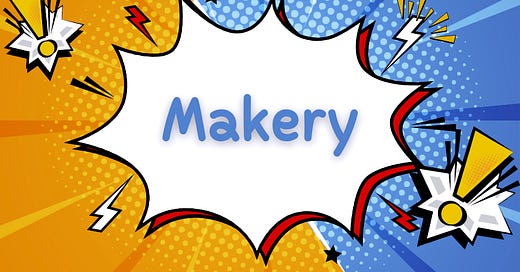Makery: Creating Sustainable Art Practice Chapter 2
Having savings and investments gives us options and allows us to move on when the time is right, so give yourself those opportunities.
Thanks for stopping by. Please check out Makery Chapter 1 before you read this chapter.
Chapter 2 focuses on financial health. I prefer to use the term' financial health' in the context of building a sustainable creative practice, rather than 'financial independence,' as these are two distinct concepts. Being financially healthy doesn’t mean you are financially independent; being financially independent doesn’t mean you are financially healthy.
To learn more about building a financially sustainable art practice, I recommend reading this post: “How to Create Financial Sustainability in Your Art and Creative Practice.”
As in Chapter 1, the questions I suggest you ask are designed to prompt pondering and wondering, helping you view your finances from a more holistic perspective.
When you work on projects, do you pay yourself? If you don’t, what is the reason? If you do pay yourself, is it the amount you truly deserve? (If you don’t know the market value of your experience and within your area of work, I suggest you do some research. Of course, there are some projects that we work on for free, but if you pay the rest of your team, you should also get paid.
If you don’t pay yourself or don’t ask to be paid what the market pays for your work and experience, what is the reason for that? This question needs some time to be pondered on, as we all might have various reasons spanning from our lived experiences and conditioning (shame, feeling of not being good enough, or that creative work doesn’t deserve to be paid for, early childhood conditioning, growing up in poverty, etc.). If it helps, make a list or journal about it. You don’t have to keep returning to that journal entry, but being aware of what is stopping you might shift your perspective.
Do you have savings and investment accounts? We all need savings just in case something happens, and investments for the future. The world and the financial markets are mega uncertain at the moment (I’m writing this on the 22nd. of April 2025); having a retirement pension provided by the government isn’t a given any more and, in some countries, the public pension is so low that survival would be difficult if not impossible. If you don’t know much about investments, I suggest you learn, as it will help you understand how money works and how you can financially secure your future. Start your financial education in the most practical and gentle way right here. (For disclosure, recently I made a massive shift in my investment portfolio to protect my assets and my sanity.)
Do you live within your means, or do you spend all the money you earn and some? If you don’t know how to live within your means, I suggest starting to keep a budget for three months and then analysing where your money goes. Identify areas where you can make cuts and achieve savings. After implementing the cuts and savings, continue to monitor your budget for the next three months. Has your budget changed a lot? What are you doing with the extra/surplus of money? If your budget remains the same, can you introduce some saving challenges into your life, such as not buying any clothes for a year, not eating out or having takeaways for a month, or not buying takeaway coffee? You can be as creative as you like here. How does your budget look after an additional three months of experimenting or setting challenges for yourself?
What have you learned about yourself and your finances after pondering and wondering about the questions above?
PS. I’m made by Made by Dyslexia, so expect small typos and big thinking.
If you enjoy my work and would like to support me, consider buying me a coffee! Your gesture would mean a lot for me & my practice 🥰buymeacoffee.com/magdaolchawska




